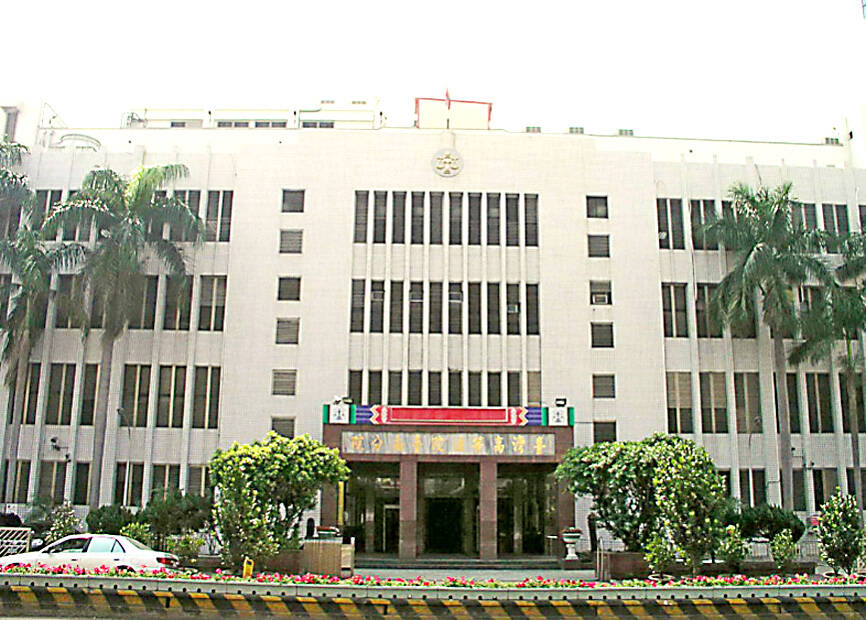A Taiwanese businessman and his son have been indicted for allegedly recruiting two soldiers to help them collect confidential information for China about Taiwan’s largest military exercise, prosecutors said on Monday.
After moving to China’s Fujian Province in 2015 to conduct business, the man, surnamed Huang (黃), and his son were “lured” by two Chinese officials he met to “collect confidential national defense documents,” the Tainan branch of the High Prosecutors’ Office said.
The duo “intended to endanger national security, and to jointly develop a network in Taiwan to lure and absorb ... active-duty servicemen,” prosecutors said in a statement issued late on Monday.

Photo: Taipei Times file
The Huangs were charged with contravening the National Security Act (國家安全法) and the Classified National Security Information Protection Act (國家機密保護法), while the soldiers were charged with contravening the Criminal Code of the Armed Forces and corruption.
The father and son allegedly asked the two soldiers, who worked for the air force’s air defense and missile division, to sign a letter pledging “allegiance” to Beijing, as well as arranged for them to meet Chinese officials abroad, the statement said.
Together, they collected eight items about the Han Kuang exercises — Taiwan’s largest annual war games, with the latest taking place two weeks ago — and “other confidential military documents” to hand over to Chinese officials either in person or by mobile phone, prosecutors said.
In other developments, the High Prosecutors’ Office has detained three suspects and restricted their communications in a broadening probe into alleged Chinese espionage involving a retired army major surnamed Hsiao (蕭), a source familiar with the matter said yesterday.
Hsiao, an instructor at the Army Chemical, Biological, Radiological and Nuclear Training Center who retired from service in April, was on July 31 released on NT$600,000 (US$18,862) bail after accusing a major, surnamed He (何), an operations officer based in Hualien and Taitung Defense Command, of being the one who provided him with classified information, the source said.
Major He has since been detained, along with a lieutenant colonel surnamed Hsieh (謝) of the Army Aviation and Special Forces Command’s 601st Aviation Brigade and businessman Xie Bingcheng (謝秉成), they said.
The major was accused of passing hundreds of pages of classified documents pertaining to the Han Kuang military exercises to Xie, the source said.
Meanwhile, the Kaohsiung branch of the High Court yesterday sentenced an army staff sergeant surnamed Tsai (蔡) to five years in prison on charges related to selling secrets to China. The sentence is subject to appeal.
The man was accused of giving classified documents to an unknown person or entity in exchange for NT$1.04 million while serving at the headquarters of Penghu Defense Command, court documents showed.
Tsai is believed to have been enticed into borrowing from an unknown person or entity that presented itself as an online money lender dealing specifically with military service members, court documents showed.
After Tsai incurred a significant amount of debt, the person or entity pressured him into surreptitiously using a digital device to make copies of classified documents at work, they said, adding that this happened multiple times in 2020.
Tsai was said to have stored the classified information he obtained, including sensitive information and operational plans, in his personal computer, court documents showed.

Authorities have detained three former Taiwan Semiconductor Manufacturing Co (TMSC, 台積電) employees on suspicion of compromising classified technology used in making 2-nanometer chips, the Taiwan High Prosecutors’ Office said yesterday. Prosecutors are holding a former TSMC engineer surnamed Chen (陳) and two recently sacked TSMC engineers, including one person surnamed Wu (吳) in detention with restricted communication, following an investigation launched on July 25, a statement said. The announcement came a day after Nikkei Asia reported on the technology theft in an exclusive story, saying TSMC had fired two workers for contravening data rules on advanced chipmaking technology. Two-nanometer wafers are the most

NEW GEAR: On top of the new Tien Kung IV air defense missiles, the military is expected to place orders for a new combat vehicle next year for delivery in 2028 Mass production of Tien Kung IV (Sky Bow IV) missiles is expected to start next year, with plans to order 122 pods, the Ministry of National Defense’s (MND) latest list of regulated military material showed. The document said that the armed forces would obtain 46 pods of the air defense missiles next year and 76 pods the year after that. The Tien Kung IV is designed to intercept cruise missiles and ballistic missiles to an altitude of 70km, compared with the 60km maximum altitude achieved by the Missile Segment Enhancement variant of PAC-3 systems. A defense source said yesterday that the number of

A bipartisan group of US representatives have introduced a draft US-Taiwan Defense Innovation Partnership bill, aimed at accelerating defense technology collaboration between Taiwan and the US in response to ongoing aggression by the Chinese Communist Party (CCP). The bill was introduced by US representatives Zach Nunn and Jill Tokuda, with US House Select Committee on the Chinese Communist Party Chairman John Moolenaar and US Representative Ashley Hinson joining as original cosponsors, a news release issued by Tokuda’s office on Thursday said. The draft bill “directs the US Department of Defense to work directly with Taiwan’s Ministry of National Defense through their respective

Tsunami waves were possible in three areas of Kamchatka in Russia’s Far East, the Russian Ministry for Emergency Services said yesterday after a magnitude 7.0 earthquake hit the nearby Kuril Islands. “The expected wave heights are low, but you must still move away from the shore,” the ministry said on the Telegram messaging app, after the latest seismic activity in the area. However, the Pacific Tsunami Warning System in Hawaii said there was no tsunami warning after the quake. The Russian tsunami alert was later canceled. Overnight, the Krasheninnikov volcano in Kamchatka erupted for the first time in 600 years, Russia’s RIA